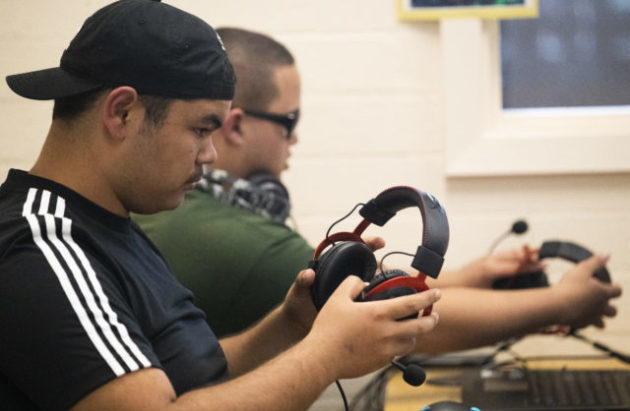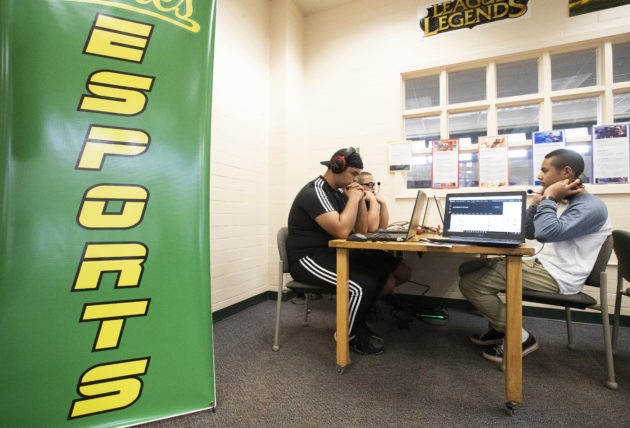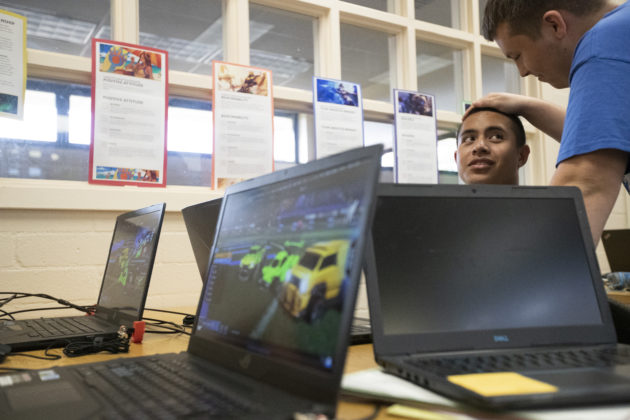
In the event that you have not opened up Tuesday’s print edition of the Star-Advertiser (or thumbed through the online edition), or stumbled upon last week’s first notice on Hawaii Prep World, let this be your digital reckoning.
Esports has arrived in Hawaii high schools. Or, in some cases, it will very soon.
Schools across the state are into their second week of competition as of today. But many of the players are still awaiting their first actual competition of HHSAA esports “Season Zero.”
Last week, there were mixed results spanning the three designated competition days of Tuesday, Wednesday and Thursday.
“League of Legends,” the game on Tuesdays, had the best combination of widespread play and successful connections across the state. The Wednesday game, “SMITE”, requires a larger pool of teams in order to undertake full competitive play. And “Rocket League” was a no go last Thursday because of connectivity issues between the Department of Education website, the PlayVS “digital referee” website, and the sites of competition themselves at the various schools. There was hope from the HHSAA on the last front that it would be operational this Thursday and play could get underway.
“Obviously we thought, because the DOE has filters and stuff like that, with their computers, we anticipated some kind of hitches,” executive director Chris Chun said over the weekend. “But yeah, hopefully we can work out all the kinks and have a good season.”
At Leilehua, where the Star-Advertiser checked out the esports digs, there was some mild frustration about the “Rocket League” launch problems but it was tempered by the knowledge that most new things rarely go off without a hitch.
“There’ve been a lot of, I guess, hurdles that we’ve gone through,” Mules esports coach Anthony Arneson said. “Especially over the winter, we were a part of a (club) league, and there many little hurdles that we learned and went through with that. But it’s the same thing with the PlayVS, initially starting out there’s hurdles that we gotta go through and all the students are willing to go through it. I’m willing to go through it and learn right along with them. End goal, it may take a couple of weeks for ‘Rocket League’ to get up and running smooth and fine, but we’ll get there. It’s all about the students.”
Mules sophomore Dominic Castillo took the esports delay in stride on Thursday. He and a few of his teammates settled for getting in some “Rocket League” matches with a visitor to campus on one of the Xboxes in Leilehua’s new designated esports wing of the library.
“I was very excited during the day to play, but after today I was a little bit sad that we couldn’t, because of all the hiccups and stuff going on,” Castillo said. “And I don’t know what was going on. I was making the matches completely fine, but at the last second it was giving us a ‘server timeout.’ … It kept happening, especially with the other team.”

One thing not explicitly addressed in the print edition story is why the competitive HHSAA games will only be played on PC, and not, say, on the Xbox One or PlayStation 4 as well.
Let me field that one here. The overriding reason is because the vast majority of esports scholarship money is for PC players. It’s the preferred medium in the world of high-level online gaming.
“We know there’s a lot of kids who play ‘Rocket League.’ But they’re not going to get scholarships off of playing the Xbox, which a lot of homes will have,” Leilehua librarian Jenny Yamamoto said. “But they can’t afford the laptop, or the PC version, and that’s the one you can get the scholarships off of. We’re just excited they’re here and they have this opportunity. We’re hoping they do good and they win.” She laughed. “As long as they try their best and they’re working hard.”
Arneson, a graduate student at Hawaii Pacific and a dedicated gamer who was ranked in “SMITE” in several characters last season, took it upon himself to call around to various schools’ esports clubs last fall in an attempt to band them together.
So far, the biggest enthusiasm is on the Big Island, where nine of the 23 schools participating statewide are located.
“The biggest things that really hooked me was, finding out for economically disadvantaged youth, 90 percent of them participate on platforms, like Xbox or PlayStation, where 90 percent of the college scholarships awarded are based only on PC gaming,” Arneson said. “So, they were basically getting taken out of the running for these college scholarships before they even got to start.”
He tossed out the stat that there were $20 million of esports scholarships awarded in 2018. That number only figures to rise to correlate with the popularity of the sport.
The HHSAA’s goal is to get the five statewide leagues to officially adopt it so that an official state tournament (possibly at HPU’s esports arena at Aloha Tower, Chun’s preferred pick) can be held as soon as next spring.

Heck yeah! I think this is a great way to give students another outlet for their creative and competitive desires. Go, kids, go!